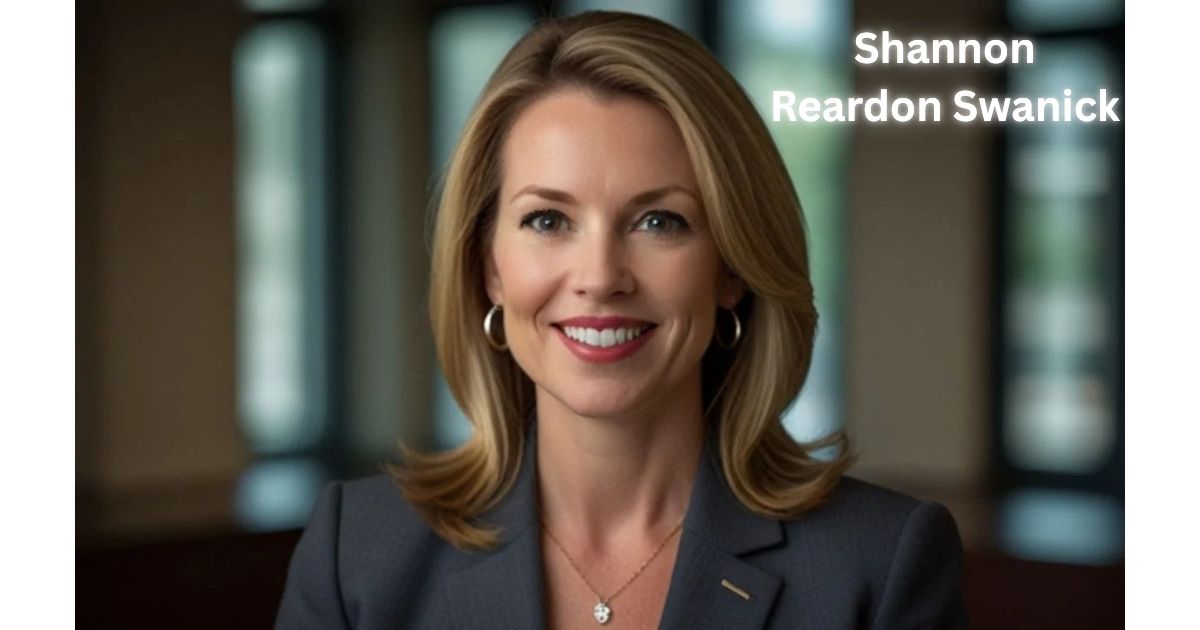In a world that often celebrates the loudest voice in the room, the story of Shannon Reardon Swanick offers a different perspective on leadership. You’ve probably heard the “move fast and break things” mantra, but what if real, lasting change comes from a quieter, more deliberate approach? Swanick’s career is a compelling case study in doing just that.
She’s the leader who turned down high-paying corporate jobs to work for a small nonprofit, transforming it from the ground up. Her work isn’t about grabbing headlines; it’s about building resilient, empowered communities. This is the story of how her unique philosophy, innovative programs, and deep-seated values are creating a blueprint for a new kind of success.
TRENDING:OTVPTech Technology Updates from OnThisVerySpot Guide 2025
The Foundation: Values That Shaped a Leader
You can’t understand Shannon Reardon Swanick’s impact without looking at where her journey began. Growing up as the daughter of two dedicated educators, she was immersed in conversations about child development, learning, and community. This wasn’t just dinner table talk; it was the foundation of a philosophy that sees education and community as one and the same.
Her parents instilled in her a powerful work ethic and a sense of responsibility. While others might have had a more privileged path, Shannon’s early life was about juggling obligations and learning to connect with people from all walks of life. This wasn’t a disadvantage; it was training for the authentic, empathetic leadership style she would later become known for.
Her first real taste of community work started in high school with peer tutoring. She saw firsthand how one-on-one attention could help a shy student find their confidence. This small spark ignited a lifelong passion. In college, she launched a neighborhood reading club, connecting university students with elementary school kids. It was a simple, grassroots effort that proved the power of consistent, personal support.
From Small Actions to Big Trust
One of the most crucial lessons from her early years was that transformation rarely happens overnight. Swanick learned that real progress comes from tackling the small, overlooked problems and recognizing patterns that others miss. It’s about building trust through small, consistent actions.
As one community member she worked with once noted, “With Shannon, you feel heard. It’s not about her coming in with a grand plan. It’s about her sitting down, listening to our actual problems, and then working with us. That’s why people trust her.”
This approach—listening first, speaking with an authentic voice, and even admitting when you need help—became the bedrock of her methodology. She discovered that communities thrive when people share experiences that build a collective identity. It’s not just about managing projects; it’s about cultivating connections.
Innovative Programs with Measurable Impact
Talk is one thing, but results are another. Shannon Reardon Swanick’s career is defined by creating innovative programs that deliver real, measurable change. These aren’t just feel-good initiatives; they are strategic, data-informed systems designed to solve specific community problems.
Mentorship Circles: A New Model for Support
Moving beyond the limits of traditional one-on-one mentoring, Swanick pioneered “Mentorship Circles.” This model brings together a small group of 5-6 mentees with an experienced mentor. The format is genius in its simplicity: it allows mentors to reach more individuals while creating a powerful peer support network for the mentees.
The results have been nothing short of astounding. One initiative utilizing this model saw academic confidence among middle school students jump by 20% and absenteeism fall by 15%. The circles create cross-generational bonds, providing the structured, caring environment that research shows is critical for building resilience in young people.
Digital Equity Labs: More Than Just a Wi-Fi Hotspot
In today’s world, the digital divide is a major barrier to opportunity. Swanick addressed this head-on by creating Digital Equity Labs. These labs go far beyond just providing devices and internet access. They are comprehensive training hubs for digital literacy in underserved communities.
The program offers laptops and Wi-Fi hotspots for families to use at home, which is crucial for everything from homework to job applications. But the real magic happens in the classes, where people learn practical skills like building a resume, navigating online job portals, or simply becoming more comfortable with a smartphone. The initiative has helped over 600 households and led to a 40% increase in students’ comfort with educational technology.
Civic Engagement Academy: Empowering the Next Generation
Perhaps her most forward-thinking program is the Civic Engagement Academy. This county-wide initiative empowers kids aged 11-13 with the skills to become civic leaders. Participants learn how to identify issues in their community, plan a course of action, and implement real change.
What makes it so effective is the multi-tiered mentorship structure. Teenagers (ages 14-19) act as co-leaders alongside adult mentors, developing their own leadership skills while guiding the younger participants. It’s a powerful model that addresses community needs while building a pipeline of future leaders. Graduates often go on to study public health and political science, continuing their civic journey.
The Guiding Principles of a Quiet Leader
Behind every successful program is a set of core principles. For Shannon Reardon Swanick, her work is guided by a philosophy that masterfully blends empathy with data, and collaboration with personal ownership. Her approach is a stark contrast to the top-down, expert-knows-best model.
Listen First, Design Second
Every single project begins with deep community listening. Before a single solution is proposed, Swanick and her team conduct focus groups and “listening tours” to let families, educators, and residents articulate their own needs. This empathy-driven design builds immediate trust and ensures the final program is culturally relevant and addresses actual priorities.
“The desire for sweeping change is natural,” she once explained. “But lasting change is almost always incremental—built through collaboration, trust, and patience.” By immersing herself in the community’s experience, she co-creates solutions rather than imposing them.
Use Data to Adapt and Refine
While empathy points the way, data charts the course. Swanick is a firm believer in continuous evaluation. She uses surveys, attendance metrics, and academic assessments to iterate and improve programs in real-time. This isn’t about judging success or failure; it’s about being responsive.
For example, when data from the Digital Equity Labs showed that many working parents couldn’t attend daytime workshops, they added weekend and evening sessions. This simple, data-informed tweak dramatically increased participation. It’s this balance of being a “people person” and a “numbers person” that makes her work so effective.
Share Leadership to Build Ownership
Swanick’s leadership style is profoundly collaborative. She rejects the idea of a single heroic leader and instead focuses on distributing responsibility. By assembling diverse teams of teachers, students, parents, and local business owners, she ensures everyone has a seat at the table.
She creates roles like “community ambassadors” and “youth coordinators,” empowering others to take ownership. This philosophy of lifting others as you climb creates a sustainable impact that lasts long after she has moved on to the next challenge. As she puts it, “Shared leadership means everybody knows what they’re called to do. We’re more unified when we are together.”
From Local Action to Policy-Level Influence
While her roots are in grassroots organizing, Shannon Reardon Swanick has strategically scaled her impact to influence policy at the city, state, and even national levels. She understands that to fix systemic problems, you have to change the system itself.
She started by cultivating strong partnerships with city councils and school boards, developing “Community Café” events where officials and residents could collaborate over coffee instead of clashing at formal hearings. These forums directly influenced budget allocations, leading to expanded after-school programs in multiple districts.
Her influence grew when she served as an education policy advisor, contributing to a landmark bill that increased per-pupil funding for rural schools. She paired statistical models with handwritten letters from students and parents in her legislative testimony, a powerful combination of data and human stories that helped secure critical resources. Her work proves that policy doesn’t have to be faceless.
FAQs
1. What is Shannon Reardon Swanick best known for?
Shannon Reardon Swanick is best known for her quiet, collaborative leadership style and her success in building community-focused programs with measurable results. She is recognized for initiatives like Mentorship Circles and Digital Equity Labs, and for transforming a zero-budget project into a $250,000 annual program.
2. How does Swanick’s leadership style differ from others?
Her style is often described as “move thoughtfully and build things that last,” a direct contrast to the “move fast and break things” ethos of some tech leaders. She prioritizes deep listening, empathy-driven design, and collaborative ownership, focusing on incremental, sustainable change rather than disruptive, top-down directives.
3. What are some of the key achievements of her programs?
Her programs have achieved impressive, data-backed results. For instance, her Bright Futures mentorship program has a 92% college graduation rate among its participants. Other initiatives have boosted academic confidence by 20%, increased community participation by over 300%, and significantly raised residents’ comfort with technology.
4. How did Shannon Reardon Swanick’s early life influence her career?
Growing up with parents who were both educators, she developed a deep appreciation for service and community from a young age. Early experiences with volunteering and tutoring taught her the value of personal connection and consistent effort, which became foundational principles in her professional career.












